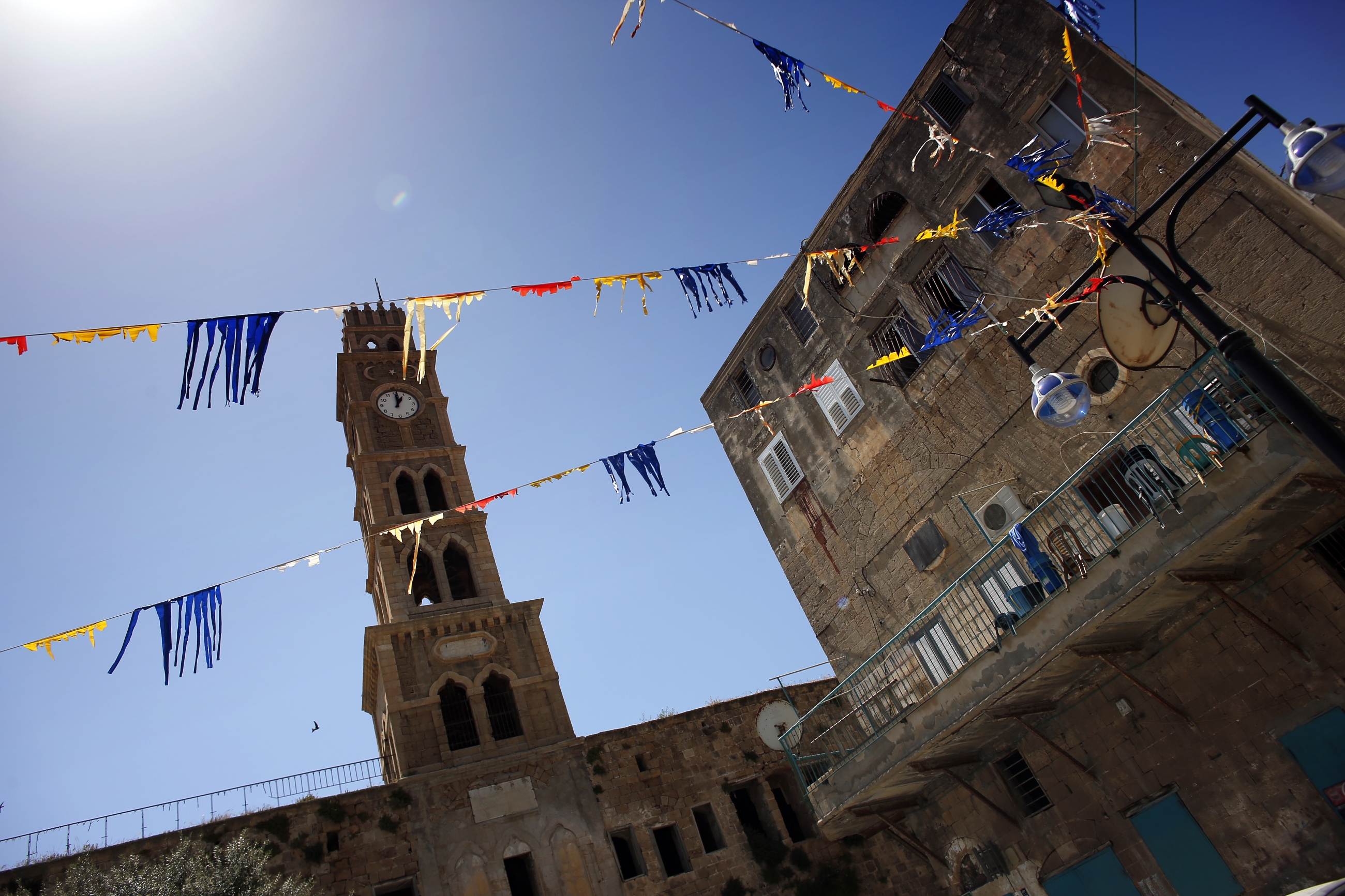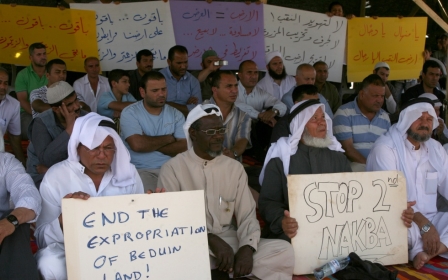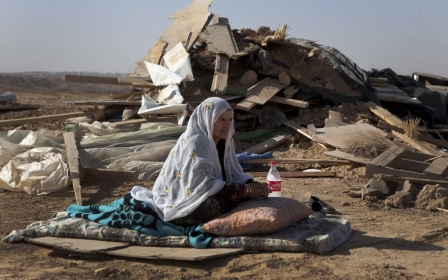Gentrification threatens Acre's Palestinians

“My husband and I were married right out there in the garden,” Zeidan, better known as Umm Ahmed, told Middle East Eye, explaining that they moved into the seaside house in 1967. “My 10 children - three boys and seven girls - were born and raised here. I now have more than 30 grandchildren who are here all the time. [The home] means a lot to my family.”
Though Acre has a 70 percent Jewish-Israeli majority, Umm Ahmed‘s family is part of the indigenous Palestinian minority that makes up nearly the entire population of the historical Old City, where dozens of families have received eviction orders throughout the years.
“The eviction order was delivered to me on 2 April,” Zeidan said, adding that she rents her home from Old Acre Development Company, a state-owned housing company that controls property confiscated from Palestinians who were displaced during the 1948 war that led to the establishment of Israel.
In Acre and other mixed Jewish-Arab cities across the country, such as Haifa and Jaffa, many Palestinians homes are leased to their residents by similar state-affiliated housing management companies. Residents often accuse these companies, such as Old Acre Development Company and Amidar, of systemic neglect with the goal of displacing Palestinians.
“The order stated that I had to be out of my house by 8 May … but I haven’t left and am not going to leave,” she explained.
Like the rest of the estimated 1.7 million Palestinians who carry Israeli citizenship and live in cities and villages across the country, the Haifa-based Adalah Legal Center notes that they suffer from more than 50 discriminatory laws that stifle their political expression and limit their access to state resources, including land.
Although Acre’s historic Old City was designated a protected World Heritage site by the United Nations Educational, Scientific and Cultural Organisation (UNESCO) in 2001, an influx of foreign and Jewish-Israeli development companies is changing the city’s face.
New restaurants and luxury hotels are popping up amid landmarks of the city’s Ottoman and Crusader history: mosques, churches, Turkish baths, and historical homes.
Meanwhile, soaring living costs and eviction orders threaten to displace much of the local Palestinian population. As the pressure increases, activists have campaigned tirelessly on behalf of housing rights and other local causes.
It would not be Zeidan’s first home eviction. Born in Acre in 1938, her family fled the city as it was under siege during the 1948 fighting. They sought refuge in the nearby village of Yarka for months before returning to Acre.
Some years later, her family was forcibly displaced by Israeli authorities from the Khan al-Umdan neighborhood of the city. “This could be my third time to be kicked out,” she said. “There isn’t anything in the world that could make me leave, though. In the past, Jewish-Israelis used to come and offer us money to buy up homes in the neighborhood. I wouldn’t sell my house for a million dollars.”
Over the years, she has watched her surroundings change drastically. Walking through the neighborhood, she points to each home and recalls its former residents. “A lawyer used to live in that building, but he left a long time ago,” she recounted. “Many people gave up because the economy was so bad, and there are no opportunities for us.”
Jihad Abu Raya, a Haifa-based lawyer who represents Zeidan, says that thousands of Palestinian residents of Acre have packed up and left over the past decade. “There’s only about 4,000 left in the Old City now, but it used to be upwards of 10,000.”
He recalled a mass outpouring of support during the late spring this year. “There were huge protests,” he told Middle East Eye. “We had demonstrators come from all over Palestine. Until today, Umm Ahmed [Zeidan] hosts visitors, activists from abroad and across the Galilee, the south [and] the West Bank. We also reopened a nearby mosque that had been closed down by Israeli authorities following 1948,” he said, adding that it has become a popular spot for prayer among the city’s Muslim community.
Abu Raya said Zeidan and contractors are currently at a standoff. “The issue has been taken to a national committee made up of Palestinian political leaders in Israel. The prospects seem likely that Umm Ahmed will stay in her home for the time being.”
Abu Raya said they needed to continue pressuring Israeli authorities, housing management companies and development groups. “Umm Ahmed’s case is representative; it isn’t just about her. Most of Acre’s Palestinians are struggling in similar situations.”
Yazid Saadi, a Palestinian activist from Acre’s Old City, echoed Abu Raya’s observations. “Since I was little, I saw the city change a lot,” he told Middle East Eye. “It used to be a center for Palestinian Arabs from all over the 1948 territory [present-day Israel], but now the only people who come to the Old City are tourists.
“When Umm Ahmed’s eviction order arrived, we understood that it could have been any of us. Through state-owned housing companies and development companies, Israeli authorities try to use several different ways of pushing us out.”
As the changes continue, locals have pushed back. Though some homes have for-sale signs, more common are signs proclaiming local residents’ intent to stay in their ancestral city. “My house is not for sale,” one such sign reads in Arabic, Hebrew and English.
In 2013, it was announced that the Khan al-Umdan (Arabic for “Caravanserai of the Pillars”), an Ottoman inn built in 1874, was going to be remodeled into a 200-room luxury hotel. Local campaigners waged a long battle that resulted in the Israel Lands Administration and the tourism branch of the Old Acre Development Company cancelling the tender.
UNESCO did not reply to Middle East Eye’s requests for a comment regarding their position on the gentrification and displacement in Acre’s Old City.
Back in her living room, Zeidan pours coffee and declares that she will stay in Acre no matter what happens. “I’ve been evicted by force twice already,” she said. “If it happens again, I will just come back to my house.”
Stay informed with MEE's newsletters
Sign up to get the latest alerts, insights and analysis, starting with Turkey Unpacked
Middle East Eye delivers independent and unrivalled coverage and analysis of the Middle East, North Africa and beyond. To learn more about republishing this content and the associated fees, please fill out this form. More about MEE can be found here.



